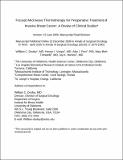| dc.contributor.author | Dooley, William C. | |
| dc.contributor.author | Vargas, Hernan I. | |
| dc.contributor.author | Fenn, Alan J. | |
| dc.contributor.author | Tomaselli, Mary Beth | |
| dc.contributor.author | Harness, Jay K. | |
| dc.date.accessioned | 2011-08-26T13:59:54Z | |
| dc.date.available | 2011-08-26T13:59:54Z | |
| dc.date.issued | 2009-12 | |
| dc.date.submitted | 2009-10 | |
| dc.identifier.issn | 1068-9265 | |
| dc.identifier.issn | 1534-4681 | |
| dc.identifier.uri | http://hdl.handle.net/1721.1/65389 | |
| dc.description.abstract | Background:
Preoperative focused microwave thermotherapy (FMT) is a promising method for targeted treatment of breast cancer cells. Results of four multi-institutional clinical studies of preoperative FMT for treating invasive carcinomas in the intact breast are reviewed.
Methods:
Externally applied wide-field adaptive phased-array FMT has been investigated both as a preoperative heat-alone ablation treatment and as a combination treatment with preoperative anthracycline-based chemotherapy for breast tumors ranging in ultrasound-measured size from 0.8 to 7.8 cm.
Results:
In phase I, eight of ten (80%) patients receiving a single low dose of FMT prior to receiving mastectomy had a partial tumor response quantified by either ultrasound measurements of tumor volume reduction or by pathologic cell kill. In phase II, the FMT thermal dose was increased to establish a threshold dose to induce 100% pathologic tumor cell kill for invasive carcinomas prior to breast-conserving surgery (BCS). In a randomized study for patients with early-stage invasive breast cancer, of those patients receiving preoperative FMT at ablative temperatures, 0 of 34 (0%) patients had positive tumor margins, whereas positive margins occurred in 4 of 41 (9.8%) of patients receiving BCS alone (P = 0.13). In a randomized study for patients with large tumors, based on ultrasound measurements the median tumor volume reduction was 88.4% (n = 14) for patients receiving FMT and neoadjuvant chemotherapy, compared with 58.8% (n = 10) reduction in the neoadjuvant chemotherapy-alone arm (P = 0.048).
Conclusions:
Wide-field adaptive phased-array FMT can be safely administered in a preoperative setting, and data from randomized studies suggest both a reduction in positive tumor margins as a heat-alone treatment for early-stage breast cancer and a reduction in tumor volume when used in combination with anthracycline-based chemotherapy for patients with large breast cancer tumors. Larger randomized studies are required to verify these conclusions. | en_US |
| dc.language.iso | en_US | |
| dc.publisher | Springer New York | en_US |
| dc.relation.isversionof | http://dx.doi.org/10.1245/s10434-009-0872-z | en_US |
| dc.rights | Article is made available in accordance with the publisher's policy and may be subject to US copyright law. Please refer to the publisher's site for terms of use. | en_US |
| dc.rights.uri | | en_US |
| dc.source | Fenn | en_US |
| dc.title | Focused Microwave Thermotherapy for Preoperative Treatment of Invasive Breast Cancer: A Review of Clinical Studies | en_US |
| dc.type | Article | en_US |
| dc.identifier.citation | Dooley, William C. et al. “Focused Microwave Thermotherapy for Preoperative Treatment of Invasive Breast Cancer: A Review of Clinical Studies.” Annals of Surgical Oncology 17.4 (2009) : 1076-1093. | en_US |
| dc.contributor.department | Lincoln Laboratory | en_US |
| dc.contributor.approver | Fenn, Alan J. | |
| dc.contributor.mitauthor | Fenn, Alan J. | |
| dc.relation.journal | Annals of Surgical Oncology | en_US |
| dc.eprint.version | Author's final manuscript | en_US |
| dc.type.uri | http://purl.org/eprint/type/JournalArticle | en_US |
| eprint.status | http://purl.org/eprint/status/PeerReviewed | en_US |
| dspace.orderedauthors | Dooley, William C.; Vargas, Hernan I.; Fenn, Alan J.; Tomaselli, Mary Beth; Harness, Jay K. | en |
| mit.license | PUBLISHER_POLICY | en_US |
| mit.metadata.status | Complete | |
